

Interview with a Taliban Insider: Iran's Game in Afghanistan - Leah Farrall - International. A long-time senior strategist for the Taliban regime who fought under the name Abu Walid al Masri was recently released from Iran after nearly a decade in captivity. In an exclusive interview, he describes Iran's relationship to the Taliban, why it and other countries may have known Osama bin Laden's hiding place, and the country's strategy in post-occupation Afghanistan Mustafa Hamid, also known as Abu Walid al Masri, shown in 1990 and in 2011 / Leah Farrall ALEXANDRIA, Egypt -- A beachside cafe in Alexandria may not seem like a place where you'd find a man who counts among his old friends Taliban leader Mullah Omar, military commander Jalaluddin Haqqani, and past and present leaders of al Qaeda.
But that's where I met with Mustafa Hamid, better known as Abu Walid al Masri, a senior mujahidin figure who was among the first Arabs to arrive in Afghanistan to fight the Soviets some 30 years ago, and the first foreigner to swear allegiance to Mullah Omar. Commander's words shed light on Taliban views - Features. Taliban Jailbreak Luke Mogelson June 2012: Newsmakers. When the stranger unbolted the cell door and whispered for them to hurry, Rahim assumed that somewhere in the prison a fight must have broken out.
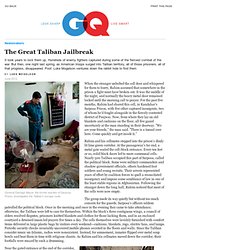
It was the middle of the night, and normally the heavy metal door remained locked until the morning call to prayer. For the past five months, Rahim had shared this cell, in Kandahar's Sarposa Prison, with five other captured insurgents, two of whom he'd fought alongside in the fiercely contested district of Panjwai. Now, from where they lay on old blankets and cushions on the floor, all five gazed uncertainly at the man standing in their doorway. "We are your friends," the man said. "There is a tunnel over here. In quotes: Excerpts from Nato report on Taliban. 1 February 2012Last updated at 08:52 The quotations are reflections from fighters detained by Isaf in Afghanistan A secret Nato report seen by the BBC suggests the Taliban in Afghanistan are being directly helped by the Pakistani security service (ISI).
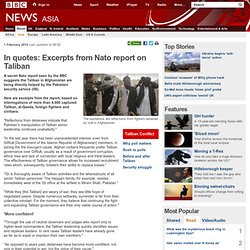
Here are excerpts from the report, based on interrogations of more than 4,000 captured Taliban, al-Qaeda, foreign fighters and civilians. How to Talk to the Taliban. Afghan Taliban spokesman Zabiullah Mujahid's announcement last week that the group will open a political office in Qatar is part of a process that could bring a peaceful end to the war in Afghanistan.
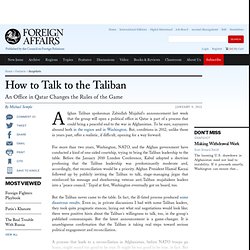
To be sure, naysayers abound both in the region and in Washington. But, conditions in 2012, unlike those in years past, offer a realistic, if difficult, opening for a way forward. For more than two years, Washington, NATO, and the Afghan government have conducted a kind of one-sided courtship, trying to bring the Taliban leadership to the table. Before the January 2010 London Conference, Kabul adopted a doctrine professing that the Taliban leadership was predominantly moderate and, accordingly, that reconciliation would be a priority. Afghan President Hamid Karzai followed up by publicly inviting the Taliban to talk, stage-managing jirgas that reinforced his message and shoehorning veteran anti-Taliban mujahideen leaders into a "peace council.
" It's Time for America to Negotiate With the Taliban - David Rohde - International. Direct talks are the least bad, and maybe only, way to wind down the Afghan War -- but it has to include Pakistan Captured Taliban insurgents and their weapons are presented to the media in Ghazni province / Reuters As American officials scramble to contain the fallout from an appalling video showing Marines urinating on dead Taliban fighters, news that the Obama administration is carrying out secret negotiations with the Taliban has barely registered on the American political landscape.
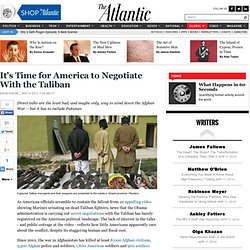
The lack of interest in the talks - and public outrage at the video - reflects how little Americans apparently care about the conflict, despite its staggering human and fiscal cost. Since 2001, the war in Afghanistan has killed at least 8,000 Afghan civilians, 5,500 Afghan police and soldiers, 1,800 American soldiers and 900 soldiers from other nations. Thousands of Taliban fighters have died as well, according to American military estimates, but no reliable figure exists. Romney is wrong. No Escape from Empire’s Graveyard - Brahma Chellaney. Exit from comment view mode.
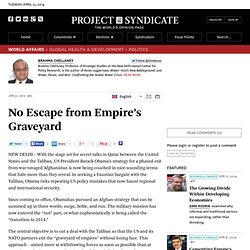
Click to hide this space NEW DELHI – With the stage set for secret talks in Qatar between the United States and the Taliban, US President Barack Obama’s strategy for a phased exit from war-ravaged Afghanistan is now being couched in nice-sounding terms that hide more than they reveal. In seeking a Faustian bargain with the Taliban, Obama risks repeating US policy mistakes that now haunt regional and international security.
Since coming to office, Obamahas pursued an Afghan strategy that can be summed up in three words: surge, bribe, and run. Talking ‘Bout Negotiation - By Shamila N. Chaudhary. The Obama administration has embarked on a fresh effort to get allies back on board with the goal of talks leading to Taliban reconciliation, following the Taliban's public acknowledgment of its willingness to negotiate.

In a Jan. 3 statement, the Taliban indicated they would establish a political office in Qatar that will be used "to come to an understanding with other nations. " Does this mark one of the most historic developments since the beginning of the war: the Taliban shedding its status as an insurgency and beginning its transformation into a state? In another statement issued Jan. 12, the Taliban reiterated its interest in increasing political efforts but added that this "does not mean a surrender from jihad and neither is it connected to an acceptance of the constitution of the stooge Kabul administration. " So, which is it -- talk or fight? Likewise, the U.S. approach of "fight, talk, build," does not mean that the administration speaks with one voice. 1. Our War Against the Pashtuns by Anatol Lieven. The situation in Afghanistan is beginning to remind me of an old Russian joke about the difference between an optimist and a pessimist.
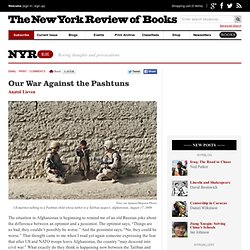
The optimist says, “Things are so bad, they couldn’t possibly be worse.” Mission Not Accomplished - By Christopher Heffelfinger. U.S.

Defense Secretary Leon Panetta's statement last month that al Qaeda's defeat is "within reach" should be cause for celebration. But given the decentralization of the jihadi movement over the past decade, that victory may be meaningless. Robert Blackwill on the War in Afghanistan. What Leaving Afghanistan Will Cost. Exploding ordnance amid the poppy fields of Kandahar Province.
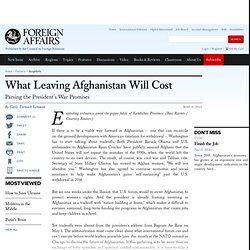
(Baz Ratner / Courtesy Reuters) If there is to be a viable way forward in Afghanistan -- one that can reconcile on-the-ground developments with American timelines for withdrawal -- Washington has to start talking about tradeoffs. Both President Barack Obama and U.S. ambassador to Afghanistan Ryan Crocker have publicly assured Afghans that the United States will not repeat the mistakes of the 1990s, when the world left the country to its own devices. The result, of course, was civil war and Taliban rule.
Secretary of State Hillary Clinton has vowed to Afghan women, "We will not abandon you. " But no one works under the illusion that U.S. forces would re-enter Afghanistan to protect women's rights. Mission Incomplete - By Bruce Riedel and Michael O'Hanlon. Afghanistan policy is in crisis, at least in the United States.

With Osama bin Laden now dead, some are wondering whether it's time to declare this mission accomplished -- or with Afghanistan so troubled, perhaps it's mission impossible? In fact, it is mission incomplete: The Afghanistan mission is going worse than we had all hoped, but better than many understand. With patience and perseverance, we can still struggle to a tolerable outcome. There is no denying that the past weeks have represented a setback for NATO efforts. Afghans, angered by the desecration of Qurans at a U.S. base, recently demonstrated violently against the NATO forces in their country, and the March 11 massacre of 16 Afghans by an apparently deranged U.S. soldier will only increase popular anger.
Making Withdrawal Work. This Week at War: Powerless in Kabul? - By Robert Haddick. President Barack Obama's sudden appearance in Afghanistan on May 1, a calculated attempt to display his administration's foreign-policy expertise and showcase his plan for ending U.S. involvement in that country's war, was overshadowed by another drama in Beijing, the U.S. Embassy's fumbling of Chinese dissident Chen Guangcheng. The global attention directed on the Chen affair showed that U.S. presidents sometimes have less power than they might presume to dominate the news. Obama and his advisors are similarly assuming that they will have the power to steer Afghanistan toward the slimmed-down objectives that remain for the U.S. campaign there. That assumption may be just as flimsy.
While in Afghanistan, Obama and Afghan President Hamid Karzai signed a strategic partnership agreement, which outlines a plan for cooperation through 2024. Obama's Afghan Exit Has Been Oversold. US President Barack Obama puts his arm on Afghan President Hamid Karzai after they signed the Strategic Partnership Agreement at the Presidential Palace in Kabul, May 2, 2012. (photo by REUTERS/Kevin Lamarque ) Author: Andrew Parasiliti Posted February 8, 2013 President Obama’s pre-dawn appearance in Kabul on May 2 to sign the “Enduring Strategic Partnership Agreement” (SPA) between the US and Afghanistan was memorable for its drama and choreography. Despite the understandable fanfare, the SPA has been oversold. Why Regional Solutions Won't Help Afghanistan.
Determined to get out of Afghanistan sooner rather than later, Washington, the United Nations, and NATO have been hunting for a multilateral regional approach to the country's woes. U.S. officials have called for neighboring countries to pitch in ahead of the drawdown and have urged Afghanistan's neighbors to develop strategic partnerships to build up infrastructure, boost trade, increase investment, and fight extremism. In effect, the move is a recognition that during its ten years in Afghanistan, the United States has handed off too little of the task of stabilizing the country to Kabul's neighbors.
As U.S. General John Allen recently indicated, there are many issues that cannot be solved out of Kabul, and Afghanistan needs a regional, not a national solution. ‘Afghanistan’ and Other Books About Rebuilding — Book Review. The Truth About al Qaeda. The chief lesson of 9/11 should have been that small bands of terrorists, using simple methods, can exploit loopholes in existing security systems. But instead, many preferred to engage in massive extrapolation: If 19 men could hijack four airplanes simultaneously, the thinking went, then surely al Qaeda would soon make an atomic bomb. As a misguided Turkish proverb holds, "If your enemy be an ant, imagine him to be an elephant. " How the Haqqani Network is Expanding From Waziristan. Why the Haqqani Network is The Wrong Target.
US night raids killed 1,500 Afghan civilians. What the Quran burnings tell us. Close your eyes, and imagine the following situation... Suppose the town or city where you live had a bunch of heavily-armed foreign soldiers living nearby. As part of their normal duties, they sent patrols down your street with some frequency, bristling with guns and other instruments of war. "America’s Islamic Blind Spots" by Naomi Wolf. Exit from comment view mode. Click to hide this space. Ann Jones: Green on Blue. Photograph via Flickr by astrogrl. Dead Americans, dead goats, and half a million gunmen on the loose. Medium rare: Some thoughts from an Afghan war vet on the Quran burning riots. When America Reflects on Why a U.S. Soldier Killed 16 Afghan Civilians - Max Fisher - International. We should try to understand what led the rogue sergeant to murder 16 Afghan civilians on Sunday, and maybe even apply the same empathy to Afghan acts of terror.
Anar Gul, right, is interviewed as she sits next to the charred body of her grandson, allegedly killed by a U.S. soldier / AP. War and massacres. Atrocities are as old as war itself. We should think twice before wading into conflicts. Photos of US troops with body parts disgusting, says Hamid Karzai. President Hamid Karzai has condemned pictures of US troops posing with the mangled remains of a suicide bomber and other insurgent corpses as inhumane and provocative, and called for a faster handover of control over security to Afghanistan's forces to avoid similar incidents in future.
US military and civilian leaders attempted to douse the latest scandal involving American troops in Afghanistan by swiftly condemning the photographs, published by the Los Angeles Times, which said it had 16 other images it had not made public. "It is such a disgusting act to take photos with body parts and then share it with others," Karzai said in a statement from his office that warned previous "similar incidents of odious nature" had sparked an angry reaction among Afghans. Taliban Corpse Photos: Friendly Fire in a Digital War. Comment: Sergeant Bales’s Shame and Ours.
Time for US Army to Police Itself: Beneath the Surface of the Kandahar Massacre. The Other Side of Justice. Afghanistan: A Gathering Menace - Neil Shea. America’s Lost Strategy in Afghanistan. Afghanistan: Violating the prime directive again. Patrick Cockburn: The death of the American dream in Afghanistan - Commentators - Opinion. America’s Lost Strategy in Afghanistan part II. Our Man in Kandahar - Magazine. The Future of Afghanistan and U.S. Foreign Policy. Apres Nous, Le Deluge. Battle lines set for new Afghanistan debate. A Secret License to Kill by David Cole. Comment: Deadly Embraces. What America Should Have Learned From Imperial Britain's Afghan Defeat - Seth G. Jones - International.
War Downsized. The Silk Road Through Afghanistan. Laying the Groundwork for Afghanistan's New Silk Road. Obama's Bagram Problem. Obama's Afghanistan Disaster - James Kitfield - International. Kicking the Afghan Can - Michael A. Cohen. Leslie H. Gelb: Obama’s Faster, Smarter Afghan Exit. Asian Exodus: The Logistical Nightmare of Leaving Afghanistan - SPIEGEL ONLINE - News - International. "The Afghan Endgame Mirage" by Carl Bildt. West's Afghan Hopes Collide with Reality. Obama Lays Out the U.S. Endgame in Afghanistan - Steve Clemons - Politics. In These Deserts: War Stories From Afghanistan: Column 20: Bombs and the Boy. Afghanistan Will Muddle Through. It’s Not Just Al-Qaeda: Stability in the Most Dangerous Region.
An Asian Answer in Afghanistan by Chandran Nair. Afghanistan: local solutions needed to settle a regional problem. Change Afghanistan Can Believe In - By Charles Kenny. Leaving Afghan Development in the Wrong Hands. Afghanistan Falls Apart - By Karen Leigh. Hearts and Minds - By Scott Clement. Drug Traffic Remains as U.S. Nears Afghanistan Exit. Afghanistan Now: ‘The People Do Not Want to Go Back’ Afghanistan’s Terrorized Women - Mohammed Musa Mahmodi.
COOL UNDER FIRE. Afghan schoolgirls poisoned in anti-education attack. Why Afghan Women Risk Death to Write Poetry. The Truth About Opium Brides. President Karzai and the Secondary Sex - by Rachel Reid. Afghanistan: Hundreds of Women, Girls Jailed for ‘Moral Crimes’ The Coming Civil War in Afghanistan - By Arif Rafiq. Will Civil War Hit Afghanistan When The U.S. Leaves? 'The Juice Ain’t Worth the Squeeze' - By Douglas Wissing. Zalmay Khalilzad on the Future of Afghanistan & Iraq. Afghanistan: A Video Portrait - Alan Taylor - In Focus. Afghanistan: February 2012 - In Focus. Afghanistan: April 2012 - In Focus. Afghanistan: March 2012. Afghanistan, January 2012. Afghanistan: The Best Way to Peace by Anatol Lieven. How Afghanistan Can Escape the Resource Curse.